Imagine this: it’s a beautiful summer evening, and you’re ready to grill up your favorite foods on your stainless steel grates. But as you start cooking, your food is sticking to the grates, and that golden brown sear seems impossible to achieve. What’s going on here? The answer lies in one simple question – do stainless steel grill grates need to be seasoned?
At first glance, seasoning stainless steel might seem like an unnecessary step. But for serious grillers, it’s a crucial part of the process. Seasoning creates a non-stick coating on the grates, making clean-up easier and preventing food from getting stuck. Plus, it helps protect the stainless steel from damage and rust, extending the life of your grill.
- But here’s the thing – seasoning stainless steel isn’t exactly like seasoning cast iron or other types of grates. You can’t just use oil or fat as you would with those materials. Luckily, there are alternative methods that are just as effective.
- So to answer the question – yes, stainless steel grill grates do need to be seasoned. But don’t worry if you’re not sure how to do it. We’ll guide you through the process step by step so that you can get back to what really matters – enjoying delicious food cooked on perfectly seasoned grates.
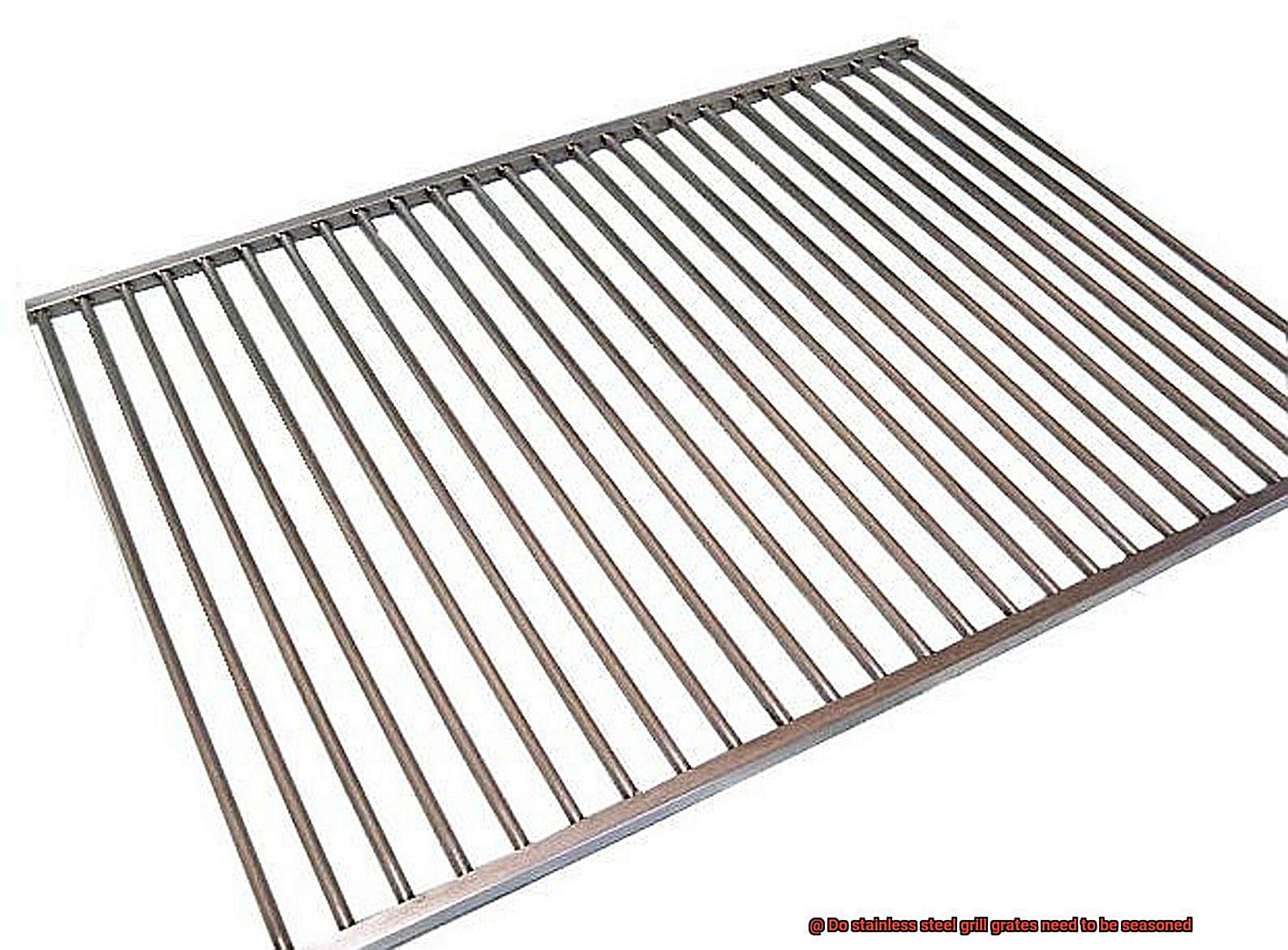
Contents
What is Seasoning?
When it comes to grilling and cooking, seasoning is a vital step that enhances the quality of your dishes. It involves applying a layer of oil or fat to the cooking surface, creating a non-stick layer, and protecting it from rust. Though it’s common practice for cast iron cookware, you can also season stainless steel grill grates to ensure optimal performance.
Seasoning your grill grates helps prevent food from sticking and makes cleaning easier by preventing food from getting stuck in small crevices. However, it’s important to note that seasoning is different from cleaning. Cleaning requires removing debris or food particles that may have stuck on the grates, while seasoning involves adding a protective layer of oil or fat to the surface.
The seasoning process is simple but crucial. First, heat the grill grates until they open up their pores. Then, brush them with high smoke point oils or fats such as canola or grapeseed oil, allowing the oil or fat to seep into the open pores and create a protective layer that prevents food from sticking.
It’s essential to use high smoke point oils or fats when seasoning grill grates. Avoid using low smoke point oils like olive oil or butter as they tend to burn at high temperatures.
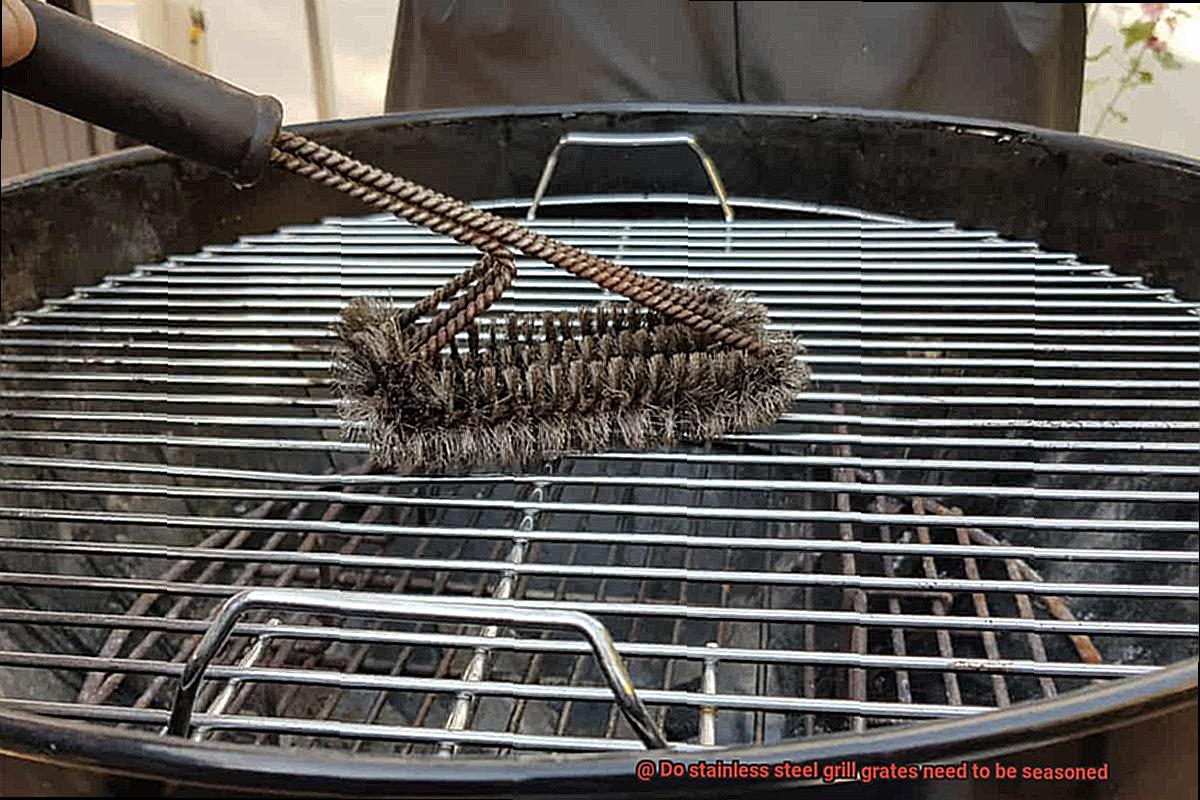
Why Do Some Grillers Choose to Season Stainless Steel Grates?
Grilling is more than just cooking food, it’s a lifestyle. And as with any lifestyle, everyone has their own opinions and preferences. One topic that often arises among grillers is whether or not to season their stainless steel grates. So why do some grillers choose to season their grates? Let’s explore.
First and foremost, seasoning your grates adds an extra layer of flavor to your food. When you season your grates, you create a non-stick surface that helps prevent your food from sticking and allows for those delicious grill marks to form. It’s like adding a secret ingredient to your cooking.
Additionally, seasoning can help create a barrier between the metal of the grates and the food, preventing any metallic flavors from transferring to your food. This is especially important when cooking delicate foods like fish or vegetables.
But flavor isn’t the only reason why some grillers choose to season their stainless steel grates. Seasoning can also protect the surface of the grates from rust and corrosion. By creating a protective layer, you prevent moisture from getting in and causing damage, which can ultimately extend the life of your grill.
And let’s not forget about maintenance. Seasoning your grates makes cleaning them easier by preventing any buildup of food or debris. Simply use a grill brush to remove any excess debris and then wipe the grates down with a clean cloth.
It’s important to note that not all stainless steel grates require seasoning. Some grills come with pre-seasoned or non-stick coated grates, while others may not need seasoning at all. Always check with the manufacturer’s instructions before seasoning your grates.
Benefits of Seasoning Stainless Steel Grates
Seasoning your stainless steel grill grates is like having a secret ingredient to your cooking. It’s an essential step that can transform your grilling experience by providing numerous benefits. Let’s take a closer look at the advantages of seasoning your stainless steel grates.
Non-Stick Surface
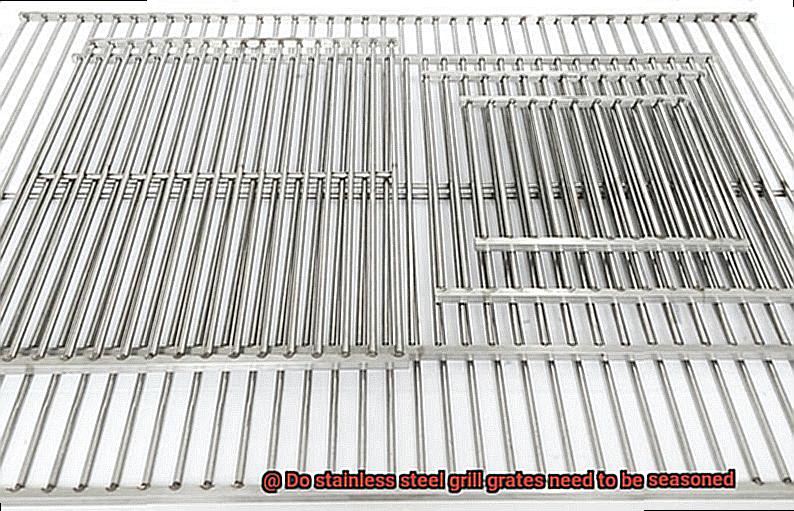
One of the most significant benefits of seasoning your stainless steel grates is creating a non-stick surface. This means that your food won’t stick to the grates, allowing for easy flipping and removal without tearing or losing those perfect grill marks. Seasoning your grates also reduces the risk of flare-ups caused by grease build-up, making grilling safer and more enjoyable.
Protection Against Rust and Corrosion
While stainless steel is known for its durability, it’s not immune to wear and tear caused by regular use and exposure to the elements. Seasoning your grates creates a barrier between the steel and moisture or debris that may cause damage. This protection against rust and corrosion can extend the life of your grill grates, saving you money in the long run.
Enhanced Flavor
As you cook on seasoned grates, natural oils and fats from your food accumulate on the surface of the grates. This creates a layer of flavor that can be passed onto your next meal, enhancing the taste of your food with every use. It’s like having a well-seasoned cast iron skillet – the more you use it, the better it gets.
Easier Cleaning
A well-seasoned grate will have fewer food particles stuck to it, making it easier to clean with a grill brush or scraper. While seasoning can make cleaning easier, it’s essential not to neglect proper maintenance of your grill grates. Regular cleaning is still necessary for optimal performance and longevity.
How to Season Stainless Steel Grates
Grilling is a fun activity that brings people together, especially during summer. However, the key to getting the best grilling results is having the right tools and techniques. One of the most important tools in your grilling arsenal is the grates on your grill. While stainless steel grates may not require seasoning as frequently as cast iron grates, it’s still essential to season them properly for optimal cooking results. In this post, we’ll explore how to season stainless steel grates and why it’s important.
What is Seasoning?
Seasoning is a process of creating a non-stick layer on a cooking surface by adding oil and heating it to a high temperature. This process is typically done with cast iron grates to prevent food from sticking and protect the surface from rust.
Why Season Stainless Steel Grates?
Stainless steel grates are naturally resistant to rust and corrosion and have a non-stick surface. However, seasoning your stainless steel grates can enhance their non-stick properties, make cleaning easier, and protect them from rust and corrosion.
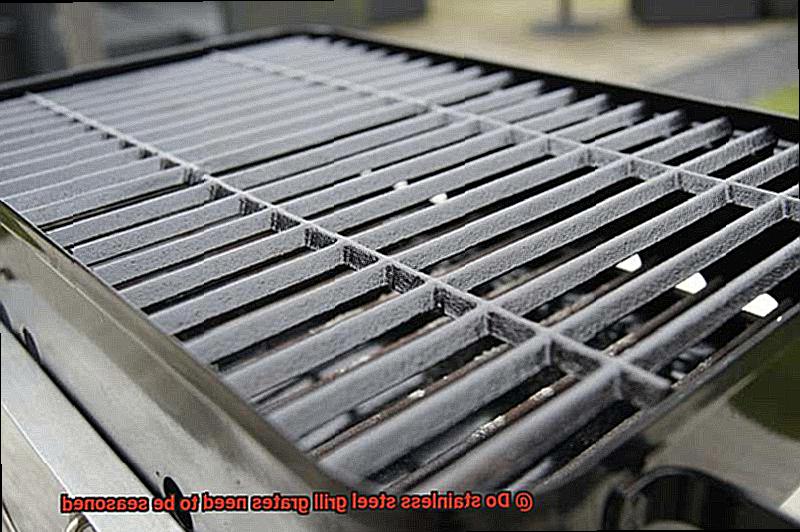
How to Season Stainless Steel Grates
Start by cleaning your stainless steel grates thoroughly with a wire brush or grill scraper to remove any debris or leftover food particles from previous use. Rinse the grates with water and dry them with a clean cloth. Apply a thin layer of high-heat cooking oil such as vegetable or canola oil onto the grates using a paper towel or brush. Heat up your grill to a high temperature (500-600 degrees Fahrenheit) for about 15-20 minutes to allow the oil to penetrate the pores of the stainless steel and create a non-stick surface. Turn off the grill and let it cool down completely before wiping off any excess oil using a clean cloth or paper towel.
Tips for Seasoning Stainless Steel Grates
Use an oil with a high smoke point to avoid burning the oil and creating a bad taste. Olive oil and butter have a low smoke point and are not recommended for seasoning stainless steel grates. Over-seasoning your grates can lead to a buildup of carbon, affecting the flavor of your food. You only need to season your grates once or twice a year, depending on how often you use your grill.
Benefits of Seasoning Stainless Steel Grates
Seasoning your stainless steel grates can make cleaning easier and protect them from rust and corrosion. It can also enhance their non-stick properties, preventing food from sticking to the grates and ensuring even cooking.
Pros and Cons of Seasoning Stainless Steel Grates
It’s no surprise that seasoning stainless steel grates has become a hot topic in the grilling community, with views divided. To help you make an informed decision, let’s dive into the pros and cons of seasoning your stainless steel grates.
Let’s start with the pros. Seasoning your stainless steel grates can prevent food from sticking, making cooking easier and ensuring that your food retains its texture and flavor. It can also improve heat distribution, especially when cooking delicate foods such as fish or vegetables. Additionally, it helps protect against rust and corrosion, which can extend the life of your grill grates and save you money in the long run.
But, like everything in life, there are some downsides to seasoning your stainless steel grates. First, it can be a messy process that involves oil and a lot of scrubbing, which some people may find tedious. Second, applying too much oil when seasoning your grates can cause flare-ups that can be dangerous – not something you want while cooking up a storm. Finally, some people believe that seasoning their stainless steel grates can negatively affect the taste of their food due to buildup of burnt or rancid oil over time.
To summarize, here is a quick list of pros and cons:
Pros:
- Prevents food from sticking
- Improves heat distribution
- Protects against rust and corrosion
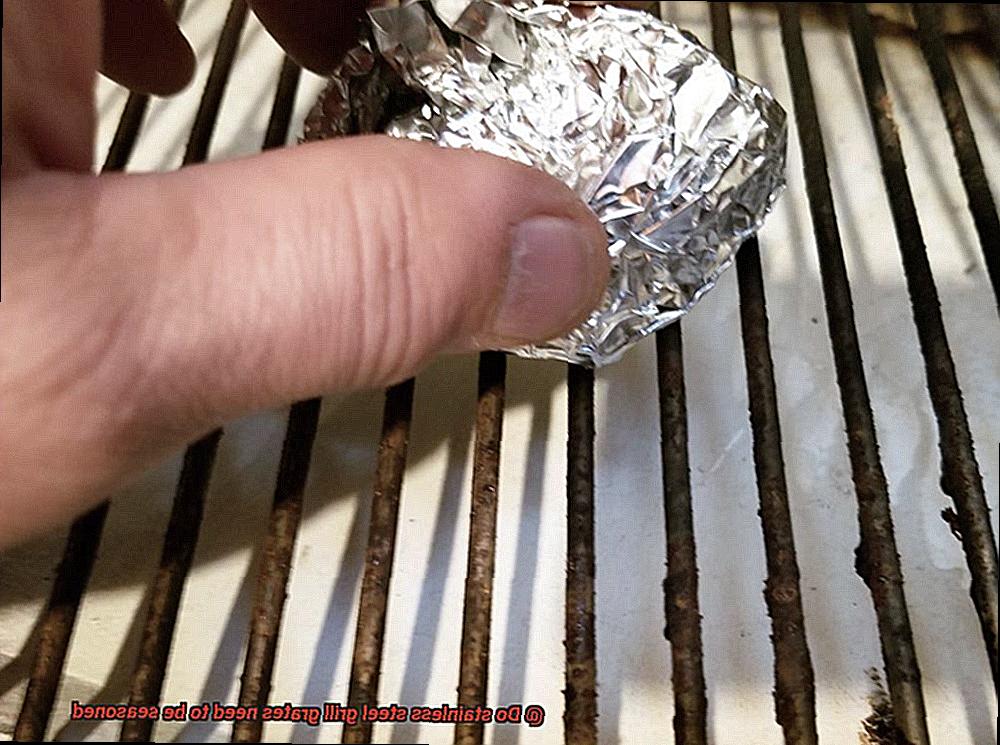
Cons:
- Can be messy
- Can cause flare-ups
- Can affect the taste of your food
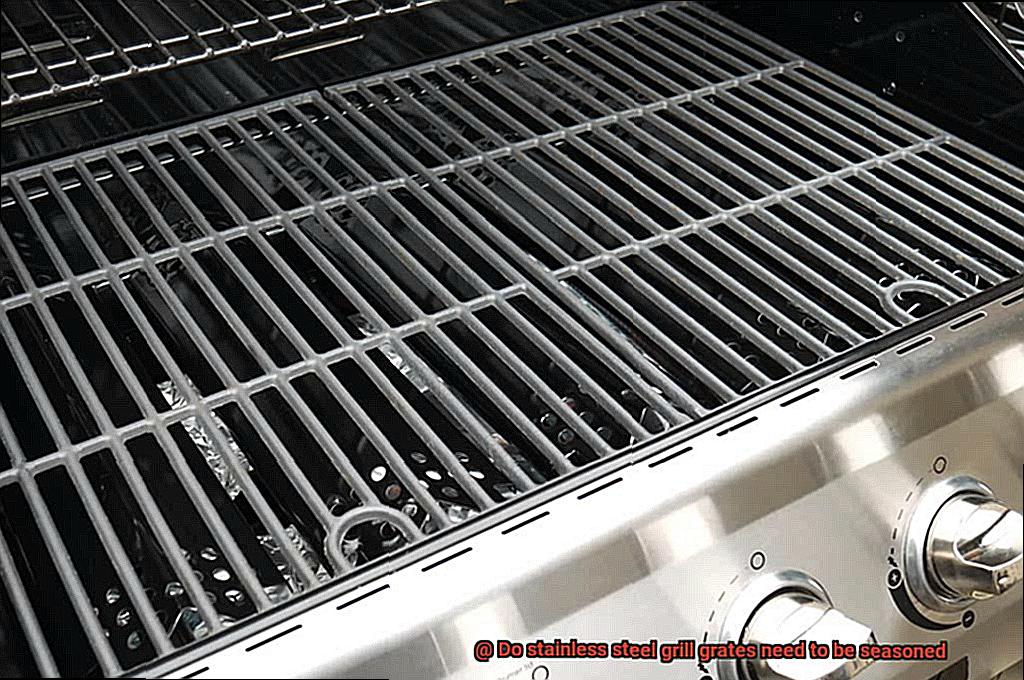

Common Mistakes to Avoid When Seasoning Stainless Steel Grates
Then it’s essential to avoid common mistakes that can ruin your grates and affect the taste of your food. By following these tips, you’ll ensure that your grates are properly seasoned and ready to cook delicious meals for years to come.
Mistake #1: Using Too Much Oil
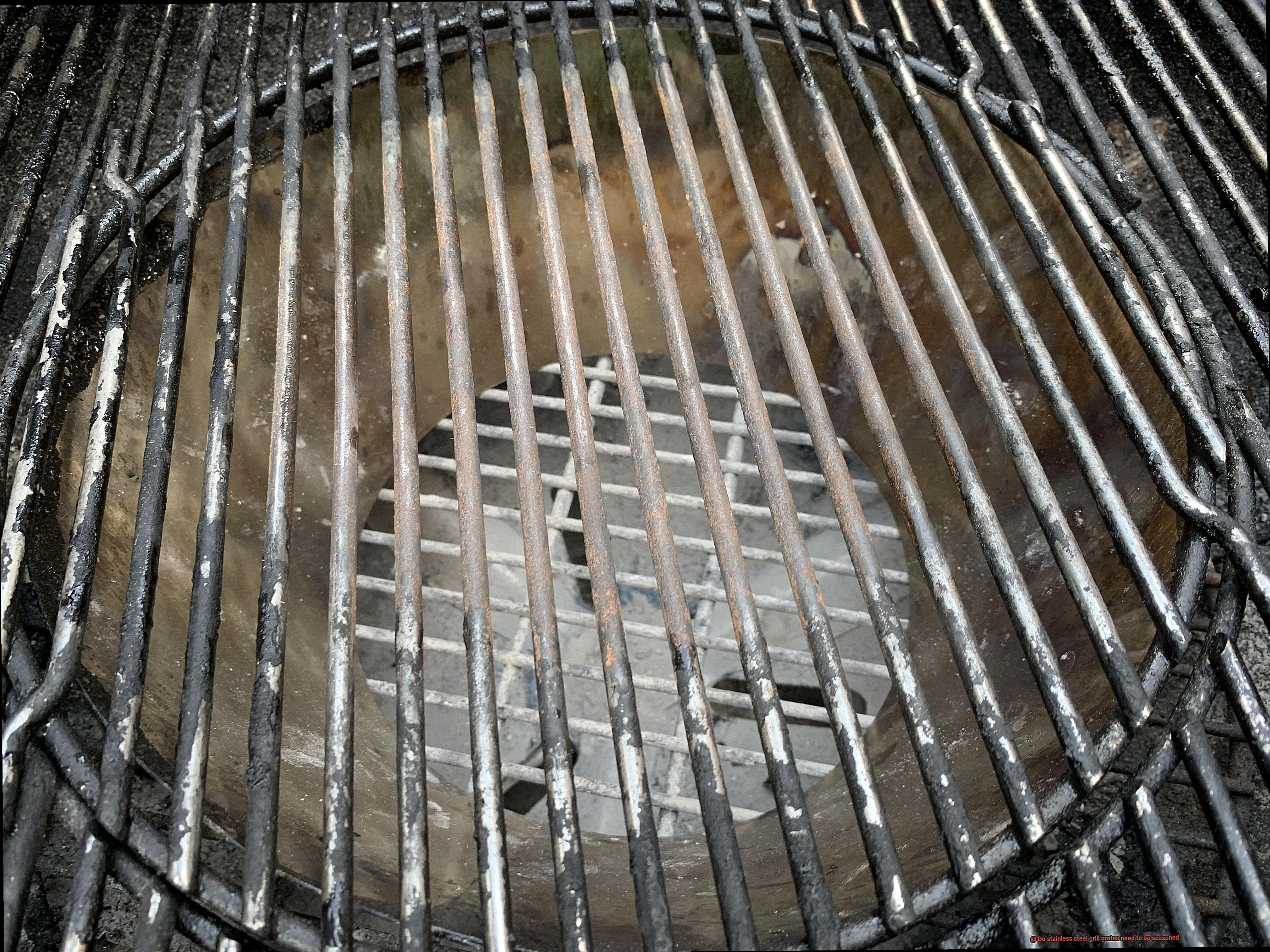
Using too much oil when seasoning your stainless steel grill grates can make them sticky or even cause them to smoke during cooking. Instead, use a minimal amount of oil to avoid this problem. A light coating is all you need for perfectly seasoned grates.
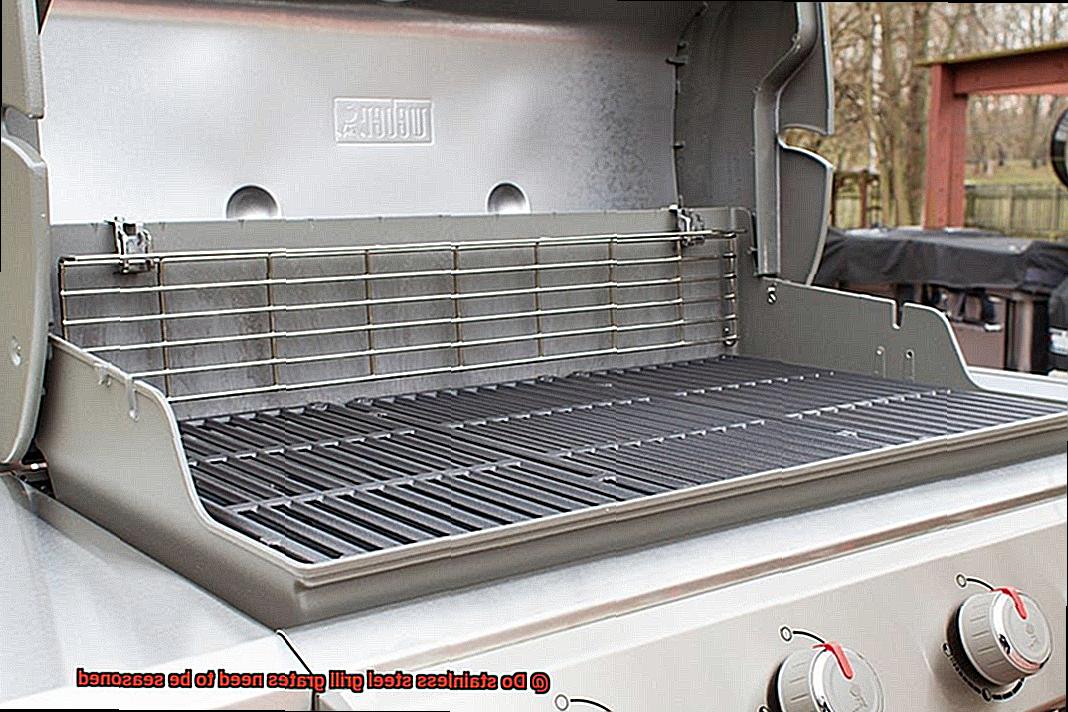
Mistake #2: Overheating the Grates
Overheating your grates during seasoning can warp or even crack them. It’s crucial to monitor the temperature and avoid exceeding the recommended heat range. Don’t let your eagerness for perfectly seasoned grates lead to overheating mishaps.
Mistake #3: Not Cleaning the Grates First
Before seasoning your stainless steel grill grates, take the time to clean them thoroughly. Any debris or food particles left on the grates can interfere with the seasoning process and affect the taste of your food. So, use a grill brush or scraper to remove any leftover residue before seasoning.
Mistake #4: Seasoning Too Often
Seasoning your grates periodically is important, but over-seasoning can create a buildup of oil and other substances that negatively impact the taste and appearance of your food. So, stick to a regular schedule and avoid overdoing it.
Tips for Maintaining Your Grill Grates
Grill grates are an essential component of any outdoor cooking setup, and they need to be well-maintained to ensure that they last for a long time. In this article, we will discuss tips for maintaining your grill grates, so they stay in good condition and enhance the flavor of your food.
Clean Your Grill Grates Regularly
Cleaning your grill grates is crucial to prevent the buildup of grease and other debris that can lead to uneven cooking and flare-ups. After each use, use a grill brush to scrape off any food particles or debris stuck on the grates. It is also essential to give them a more thorough cleaning every few uses.
Oil Your Grill Grates Before Each Use
Oiling your grill grates before each use can help prevent food from sticking and make cleanup easier. You can use a high heat cooking oil like vegetable or canola oil, and apply it using a paper towel or brush.
Season Your Stainless Steel Grill Grates (Optional)
Although it’s not necessary, seasoning stainless steel grill grates can help add flavor and create a non-stick surface. To season your grill grates, brush them with oil and heat them up on high for about 15-20 minutes.
Store Your Grill Grates Properly
To prevent rusting or corrosion, it’s essential to store your grill grates properly when not in use. Keep them dry and covered if possible, especially if you live in an area with harsh weather conditions like rain or snow.
Address Rust Immediately
If you notice any rust on your grill grates, it’s crucial to address it immediately to prevent further damage. You can remove rust by scrubbing the affected area with a wire brush or using a rust remover product.
WlTRAyoaZ4k” >
Conclusion
In conclusion, seasoning your stainless steel grill grates is an essential step to take if you want to elevate your grilling game. Not only does it create a non-stick surface for your food, but it also protects against rust and corrosion while adding a delicious flavor to every meal.
Don’t be fooled into thinking that seasoning your grill grates is just an optional extra. Serious grillers know that it’s the key to achieving perfectly cooked meals every time. So, if you want to impress your guests with mouth-watering burgers or juicy steaks, make sure you season those grates.
To get started, begin by giving your grill grates a thorough cleaning with a wire brush or scraper. Then apply a thin layer of high-heat cooking oil like vegetable or canola oil onto the grates and heat up your grill to a high temperature for about 15-20 minutes. Once done, let the grates cool down completely before wiping off any excess oil.
It’s important not to make common mistakes such as using too much oil, overheating the grates, not cleaning them first, or over-seasoning them. By following these simple tips and maintaining your grill grates regularly through cleaning and proper storage, you can ensure they last for years to come while enhancing the flavor of all your favorite foods.






